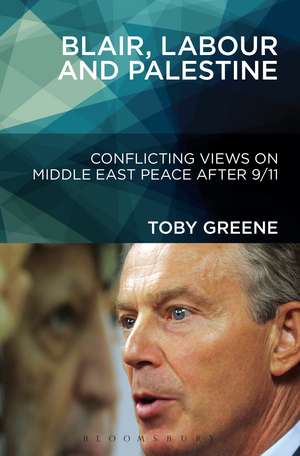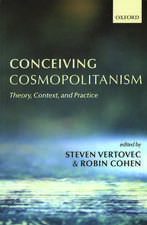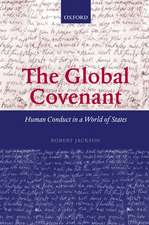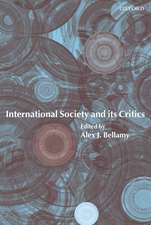Blair, Labour, and Palestine: Conflicting Views on Middle East Peace After 9/11
Autor Dr. Toby Greeneen Limba Engleză Paperback – 2 iul 2014
| Toate formatele și edițiile | Preț | Express |
|---|---|---|
| Paperback (1) | 220.75 lei 6-8 săpt. | |
| Bloomsbury Publishing – 2 iul 2014 | 220.75 lei 6-8 săpt. | |
| Hardback (1) | 892.32 lei 6-8 săpt. | |
| Bloomsbury Publishing – 31 iul 2013 | 892.32 lei 6-8 săpt. |
Preț: 220.75 lei
Preț vechi: 246.35 lei
-10% Nou
Puncte Express: 331
Preț estimativ în valută:
42.24€ • 44.10$ • 34.96£
42.24€ • 44.10$ • 34.96£
Carte tipărită la comandă
Livrare economică 05-19 aprilie
Preluare comenzi: 021 569.72.76
Specificații
ISBN-13: 9781628923995
ISBN-10: 1628923997
Pagini: 312
Dimensiuni: 152 x 229 x 23 mm
Greutate: 0.5 kg
Editura: Bloomsbury Publishing
Colecția Bloomsbury Academic
Locul publicării:New York, United States
ISBN-10: 1628923997
Pagini: 312
Dimensiuni: 152 x 229 x 23 mm
Greutate: 0.5 kg
Editura: Bloomsbury Publishing
Colecția Bloomsbury Academic
Locul publicării:New York, United States
Caracteristici
Analyzes Tony Blair's position on Palestine, a topic that has not received systematic attention.
Notă biografică
Dr. Toby Greene is a political analyst specialising in the Israeli-Palestinian arena and UK-Israel relations. He holds a PhD from UCL in Politics and Middle East studies.
Cuprins
Introduction1. Roots of British Policy in the Israeli-Palestinian Arena2. New Labour and the Israeli-Palestinian Question3. "Patient and Quiet Diplomacy" in Labour's First Term4. Radical Islam, 9/11 and the Israeli-Palestinian Issue5. The Israeli-Palestinian Issue and the Response to 9/116. The Israeli-Palestinian Issue and the Iraq War7. The Israeli-Palestinian Arena Becomes "The Issue"8. The Israeli-Palestinian Issue and Domestic Counter-radicalisation9. Blair Confronts "Radical Islam"ConclusionBiblioIndex
Recenzii
A clear and balanced account of the longer history of British foreign policy on the region when Blair was Prime Minister, and particularly after 9/11...If you are interested in what Blair's policy actually was, as opposed to what the Ribbentrop-Molotov alliance of the right and the anti-left said it was, this is a superb account...The summary of Britain's involvement in the creation of Israel, and the history of the Labour Party's attitude to the conflict, is one of the best short accounts I have read...the section on how attitudes among Labour MPs to Israel-Palestine played a part in Blair's downfall, in the Brownite "coup" of September 2006, is excellent...an impressively fair-minded treatment of an important question, in which Blair continues to play a role.
This is a fascinating and important book which examines both the broad sweep of Labour's attitude to Israel and Palestine over the decades, and looks in detail at how New Labour policymakers grappled with contradictory views - at home and abroad - of Israel's importance to the Iraq war and to the growing threat of domestic extremism post-9/11.
Tony Blair's approach to the Israel-Palestine conflict has been obscured because of the outraged reaction to his involvement in the invasion of Iraq. For many within the British Labour party, the issue became part and parcel of the megaphone war between New Labour and its opponents. It had little to do with the harsh reality and the profound tragedy that afflicted ordinary Israelis and Palestinians. Toby Greene has reclaimed the detail of Blair's worldview and demystified it for the interested student of Middle East politics.
Public discussion of both Tony Blair and the Israeli-Palestinian conflict is all too often shallow and shrill, obscuring more than it reveals. In contrast, Greene brings light, depth and nuance to this important study of the statesmen who has played a more significant role on the issue than any other European in the first decade of the new millennium. Like him or loathe him, Blair cannot be ignored; and Greene does an excellent job of getting to the ideological foundations driving Blair's policy on Israel and the Palestinians.
By offering a detailed analysis of the views held by Blair and key figures within the government and the Labour Party, Greene provides an important contribution that complements other scholarly work on British foreign policy towards the Middle East ... Blair, Labour and Palestine offers a different perspective in explaining foreign policy towards the Israeli-Palestinian conflict, by focussing on the role of ideas and the personal world views of political leaders.
Well researched and informative and may cause some Israelis to take a somewhat more benign view of Tony Blair's present endeavors in this part of the world.
This is a fascinating and important book which examines both the broad sweep of Labour's attitude to Israel and Palestine over the decades, and looks in detail at how New Labour policymakers grappled with contradictory views - at home and abroad - of Israel's importance to the Iraq war and to the growing threat of domestic extremism post-9/11.
Tony Blair's approach to the Israel-Palestine conflict has been obscured because of the outraged reaction to his involvement in the invasion of Iraq. For many within the British Labour party, the issue became part and parcel of the megaphone war between New Labour and its opponents. It had little to do with the harsh reality and the profound tragedy that afflicted ordinary Israelis and Palestinians. Toby Greene has reclaimed the detail of Blair's worldview and demystified it for the interested student of Middle East politics.
Public discussion of both Tony Blair and the Israeli-Palestinian conflict is all too often shallow and shrill, obscuring more than it reveals. In contrast, Greene brings light, depth and nuance to this important study of the statesmen who has played a more significant role on the issue than any other European in the first decade of the new millennium. Like him or loathe him, Blair cannot be ignored; and Greene does an excellent job of getting to the ideological foundations driving Blair's policy on Israel and the Palestinians.
By offering a detailed analysis of the views held by Blair and key figures within the government and the Labour Party, Greene provides an important contribution that complements other scholarly work on British foreign policy towards the Middle East ... Blair, Labour and Palestine offers a different perspective in explaining foreign policy towards the Israeli-Palestinian conflict, by focussing on the role of ideas and the personal world views of political leaders.
Well researched and informative and may cause some Israelis to take a somewhat more benign view of Tony Blair's present endeavors in this part of the world.













